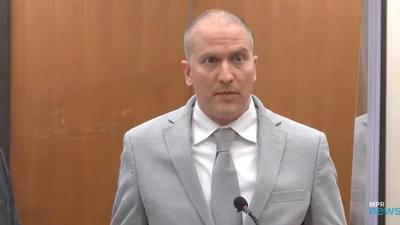
President Biden has released a statement about Chauvin’s sentencing, saying that it “seems appropriate”.
Biden said he doesn’t know all the details of the sentencing for former police officer Derek Chauvin for killing Minneapolis's George Floyd (the 22 1/2-year sentence just came down).
But it seems appropriate, the president said.
per @jeneps in Oval
— Jennifer Jacobs (@JenniferJJacobs) June 25, 2021
Judge Cahill handed down a sentence of 270 months – 22.5 years – to Chauvin, with a credit for 199 days of time already served.
The sentence is greater by 10 years than the 150-month (12.5 years) “recommended” sentence (represented by the average sentence for a second-degree murder conviction, the most senior of Chauvin’s charges).
Before handing down the sentence the judge delivered a brief statement, insisting that his decision wasn’t based on public opinion, the sentence is not based on emotion or sympathy, but at the same time, I want to acknowledge the deep and tremendous pain that all the families are feeling especially the Floyd family…I acknowledge the pain not only of those in this court room but Floyd family members outside this courtroom…most importantly we need to recognize the pain if the Floyd family.”
The sentence, the judge said, is based on “your abuse of position and cruelty to George Floyd.” Prosecutors had asked the judge to hand down a 30 year sentence.
In addition to the order, the judge released a 22-page sentencing memorandum, which will be released shortly.
Assuming he maintains a record of good behavior, Chauvin can be out in 15 years, serving the rest of his sentence on probation. To be sure, he is also now the focus of a federal investigation that seems intended solely to ensure that he will never be a free man again.
In a move that surprised the court and the thousands watching from home, Derek Chauvin was called to deliver a very brief statement Friday just before his sentencing hearing entered a brief recess.
Though he said that his comments would be limited due to the ongoing federal civil rights investigation that could see him slapped with additional federal charges, Chauvin offered his condolences to the Floyd family – many members of whom delivered testimony at the hearing today – and said that there “is going to be some other information in the future that would be of interest, and I hope things will give you some peace of mind, thank you.”
This is notable since Chauvin didn’t take the stand at his trial: this is effectively the first public statement we’ve heard from Chauvin since his arrest last year. It was also the first time he’s said anything to the Floyd family.
Earlier in the hearing, Chauvin’s mother, Carolyn Pawlenty shared a brief statement defending Chauvin’s character and rebutting criticisms that he was a ruthless racist. “My son is a good man,” she said.
“When you sentence my son, you will also be sentencing me. I will not be able to see Derek, talk to him on the phone, or give him our special hug. When he is released, his father and I most likely will not be here,” his mother said. “Derek, my happiest moment is when I gave birth to you, and my second is when I was honored to pin your police badge on you…Derek I want you to know that I have always believed in your innocence and I will never waiver from that.”
All in all, it has been a day filled with wrenching testimony. A sentence will finally be announced when the hearing resumes at 1545ET (1445 local time).
Two months after he was found guilty on all three counts of murder and manslaughter, former Minneapolis police officer Derek Chauvin will be sentenced Friday afternoon in a Hennepin County courtroom on charges that he murdered George Floyd.
The former officer could receive up to 40 years in the pen (practically all of which will be spent in “protective custody” that’s essentially solitary confinement), depending on what the judge in his case ultimately decides. Since all of his charges stem from one illegal act, Chauvin will be sentenced based only on the criteria for the most serious charge that he was convicted on: second-degree murder.
While 40 years is technically the maximum sentence, case law dictates that the judge likely won’t agree to anything over 30 years. 30 years is more than double the average sentence for second degree murder (which in Minnesota is only 12.5 years).
Hennepin County judge Peter Cahill (the same judge who handled Chauvin’s trial) will preside during Friday’s hearing, where both the prosecutors and Chauvin’s defense team will speak before the sentence is handed down. Chauvin will have an opportunity to speak, but legal experts expect him to pass since anything he says could be used against him by federal investigators looking to prosecute Chauvin for a federal civil rights violation.
Cahill on Friday morning tossed a request from Chauvin’s legal team for a new trial. Judge Cahill denied the request because defense attorney Eric Nelson failed to demonstrate that Chauvin was denied a fair trial.
Ultimately, whether the sentence Cahill hands down will satisfy observers and supporters of Floyd and his family, particularly those who want to see Chauvin receive a lengthy term, remains to be seen. Civil Rights lawyer Ben Crump, who represents Floyd’s family in a civil suit, plans to hold a news conference, along with members of the family, after the sentencing.
Whatever sentence he receives, it’s extremely unlikely that he will serve anywhere close to the entirety behind bars. In Minnesota, it’s fair to assume that a defendant with good behavior will only serve two-thirds in prison before being released to serve the rest on parole.
That means if Chauvin is sentenced to 30 years, he would likely serve 20 behind bars, as long as he causes no problems in prison. Once on supervised release, he could be sent back to prison if he violates conditions of his parole.
The sentencing is slated to begin at 1330 Minneapolis time (1430ET).
Via Zero Hedge



